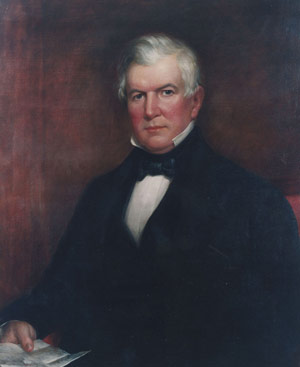Governor David Rittenhouse Porter
Term
January 15, 1839 - January 21, 1845
Affiliation
Jacksonian Democrat
Born
October 31, 1788
Died
August 6, 1867

Photo courtesy of Capitol Preservation
Committee and John Rudy Photography
Biography
The election of David Rittenhouse Porter as the first governor under the Constitution of 1838 brought the state capital, Harrisburg, close to bloody conflict between supporters and opposing partisans. Born October 31, 1788, near Norristown, Montgomery County, Porter was the grandson of an Irish Presbyterian immigrant, Robert Porter, and the son of Andrew and Elizabeth (Parker) Porter. Andrew Porter distinguished himself in battle as a Revolutionary general, later became the state's surveyor general, but turned down an appointment by President James Madison to become secretary of war. Much of David's family attained prominence in a number of professions, including lawyers, the governor of the Territory of Michigan, a candidate for president, a Civil War general, merchants, a doctor, members of the legislature, a judge, and various county row offices. So successful was his family, that Porter's political opponents complained that he had an unfair advantage.
Governor Porter received a classical education at Norristown Academy, but changed his plans to attend Princeton after the university suffered a disastrous fire in 1802. In 1809, when Governor Simon Snyder appointed his father surveyor general, young Porter went to work for his father in Harrisburg. Another young friend from Montgomery County, Francis R. Shunk, who would follow Porter as governor, accompanied him to Harrisburg. Following the death of his father in 1813, Porter moved to Huntingdon where he studied law with Edward Shippen and eventually purchased an iron works. However, recession following the War of 1812 and a resulting business failure changed his life by 1819. He turned to politics, being elected to the General Assembly, and married Josephine McDermott in 1820. He also served in row offices in Huntingdon County and then was elected to the Pennsylvania Senate in 1836.
In 1838 Porter was nominated for governor by the Jacksonian Democrats in order to mend the split between former Governor George Wolf and the Rev. Henry A. Muhlenberg, as well as defeat incumbent Governor Joseph Ritner's bid for a second term. By then the public had grown tired of the Anti-Masonic Party's "witch hunts," giving Porter a slim 5,500-voter margin of victory. The election result was bitterly contested by Ritner's supporters nearly to the point of violence. Known as the "Buckshot War," Governor Ritner was forced to order militia intervention in Harrisburg for the peaceful transition of government. Porter's victory was certified by the legislature only a few days before his inauguration.
Upon taking office, Governor Porter was immediately challenged with heavy state spending, coupled with a recession that began in 1837. Affable, eloquent, but succinct in expression, his statements often moralized against the improvident profusion in spending. He obtained a tax on persons in professions and the trades that was much like an income tax, and the first tax on capital stock shares. He cut state spending and hiring, although his administration continued the work on the expansion of canals and railroads. The governor also promoted the economic benefits of connecting canals and railroads between Pittsburgh and points west to the capitals of Ohio, Indiana, and Illinois, and to the Mississippi River at St. Louis. Although the total state debt rose twenty-five percent under Porter, the Commonwealth eventually had more than enough revenue to pay the interest. Porter resisted attempts by the General Assembly to encroach upon constitutional separations of the executive and judicial branches and refused to recognize some demands of the legislature. Porter easily won re-election in 1841 over John Banks, the first Whig gubernatorial candidate to run without a coalition with the Anti-Masonic Party. During his second term, the imprisonment of people for debts was abolished, but he faced difficult decisions with a rise of anti-foreign prejudice. During "Nativist riots" in Philadelphia in 1844, mainly directed toward Irish Catholic immigrants, Governor Porter acted firmly to suppress violence. The new state constitution no longer allowed a third term as governor and acrimony with the assembly - including attempts to impeach him—and his own party's position against protective tariffs, which Porter favored, caused the governor to retire from politics.
After 1844, he resumed his private business in iron making, returning to public life only briefly in 1856 to endorse his longtime friend James Buchanan for president. Porter became involved in promoting a transcontinental railroad through Texas and adapting anthracite coal to iron making. He built the first anthracite coal furnace for iron in south central Pennsylvania at Harrisburg.
Speaking out against Southern secession from the Union, he lived long enough to see his son, Lt. Col. Horace Porter, later a general, gain honor through a number of Civil War battles. As the aide-de-camp for General Grant, Porter was present to witness the surrender of General Lee. David R. Porter died August 6, 1867, at age seventy-eight, from a long illness contracted the previous winter after attending a night church meeting in Harrisburg. He is buried in Harrisburg Cemetery.
Pages in this Section
- 1790-1876
- Thomas Mifflin
- Thomas McKean
- Simon Snyder
- William Findlay
- Joseph Hiester
- John Andrew Shulze
- George Wolf
- Joseph Ritner
- David Rittenhouse Porter
- Francis Rawn Shunk
- William Freame Johnston
- William Bigler
- James Pollock
- William Fisher Packer
- Andrew Gregg Curtin
- John White Geary
- John Frederick Hartranft